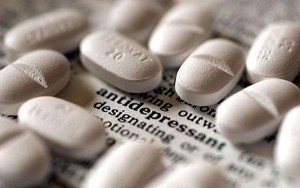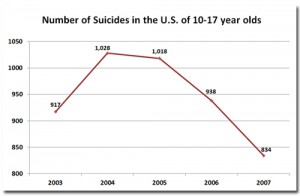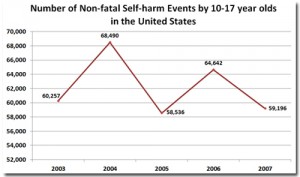“Regardless of the agenda of the authors, and contrary to the misplaced media hype, the “quasi-experimental” study provides no scientific proof that decreased antidepressant use (because of the “Black box” warnings) increased the rate of suicide attempts.“
Spin Doctors Attempt To Downplay Antidepressant Risks—New Study Claiming Black box warnings on antidepressants caused increase in suicide attempts fails to produce any evidence to substantiate this claim

In an obvious attempt to remove the Food and Drug Administration’s (FDA) “Black box” warnings, placed on all antidepressants, a recently published study in the British Medical Journal (BMJ) claims that “safety warnings about antidepressants and widespread media coverage decreased antidepressant use, and there were simultaneous increases in suicide attempts among young people.” While media outlets are covering this conclusion without question, running headlines such as “Black Box Warnings Raise Suicide Attempts” or as USA Today wrote, “Warnings on Antidepressants May Have Backfired, ” none apparently read the study as it fails to produce any scientific evidence that supports its conclusions and, worse still, has little to do with suicide attempts at all.
In a nutshell, the BMJ study suggests that the “Black box” suicide warnings reduced the number of antidepressants being prescribed and, subsequently, there was an increase in suicide attempts in a certain age group over a specific time frame. The problem is neither their logic nor methodology support removing the FDA’s most severe warning on antidepressants.
Recall that in 2004, the FDA placed Black box warnings on all antidepressant drugs because the agency found suicidality associated with antidepressant use. The FDA wasn’t the only drug regulatory agency to notice the antidepressant-suicide link—there have been 37 drug regulatory agency warnings from eleven countries—the United States, Canada, Japan, Australia, New Zealand, Ireland, Russia, Italy, Denmark, Germany, the United Kingdom—and the European Union, on antidepressant drugs causing suicide, suicide risk and attempts.

Despite mainstream media’s coverage of the BMJ article, a closer review reveals serious flaws and twisted logic:
For example, the study’s authors used a “validated proxy” (representation) for determining “suicide attempts.” Specifically the authors reviewed the number of people admitted to hospitals and emergency rooms due to “psychotropic drug poisonings.”
In other words, the people the study’s authors claim as suicide attempts,were already on psychotropic drugs. Whether these “drug poisonings” were accidental or not, it seems to argue more in favor of black box warnings then against them as these were people on psychotropic drugs (the authors did not bother to include what psychotropic drugs the people experiencing psychotropic drug poisonings were on).
To make this perfectly clear, the problem with this method is that the data does not actually prove that a person has been admitted because of an intended suicide attempt or, rather, whether there was an accidental overdose of psychotropic drugs. If there was an attempted suicide, one would expect the authors to make public which psychotropic drugs, or combinations, prompted the “psychotropic drug poisonings. One also would expect the authors would want to take this information into consideration as part of the conclusions. They didn’t.
Even if antidepressants weren’t involved (which the authors don’t disclose), but other psychotropic drugs were involved, one also would expect at least some interest and acknowledgment, questioning what role these other psychotropic drugs played in the drug poisonings and were these “poisonings” accidental or intended? They didn’t.
These are all valid questions. But none of them are addressed in the study.

In fact, Columbia Professor of Psychiatry, Mark Olfson, and Michael Schoenbaum of the National Institute of Mental Health (NIMH), responded to these conclusions saying, “Acute care visits for psychotropic drug poisoning is clearly an unreliable measure of suicide attempts.”
Olfson and Schoenbaum further explain that “a more plausible explanation for the reported findings is that the FDA warnings slowed prior growth in the rate of antidepressant treatment. In the following years, there was substantial—but likely unrelated—increase in emergency department visits and hospital admissions by young people in the United States related to the non-medical use of benzodiazepines, stimulants, and other psychotropic agents,” most of which “are not suicide attempts.”
Despite the study’s conclusion, data provided by other respected sources paints a very different picture.

According to data provided by the Centers for Disease Control and Prevention (CDC) and IMS Health, between 2004-2007, there was a 20% decrease in the number of 10-17 year-olds on antidepressants, and a 14% decrease in the number of non-fatal self-harm events for this age group. There also was a 19% decrease in the number of completed suicides.
Source:
http://www.thelibertybeacon.com/2014/07/14/new-study-claiming-black-box-warnings-on-antidepressants-raised-suicide-attempts-is-bogus/


.jpg)

Post a Comment